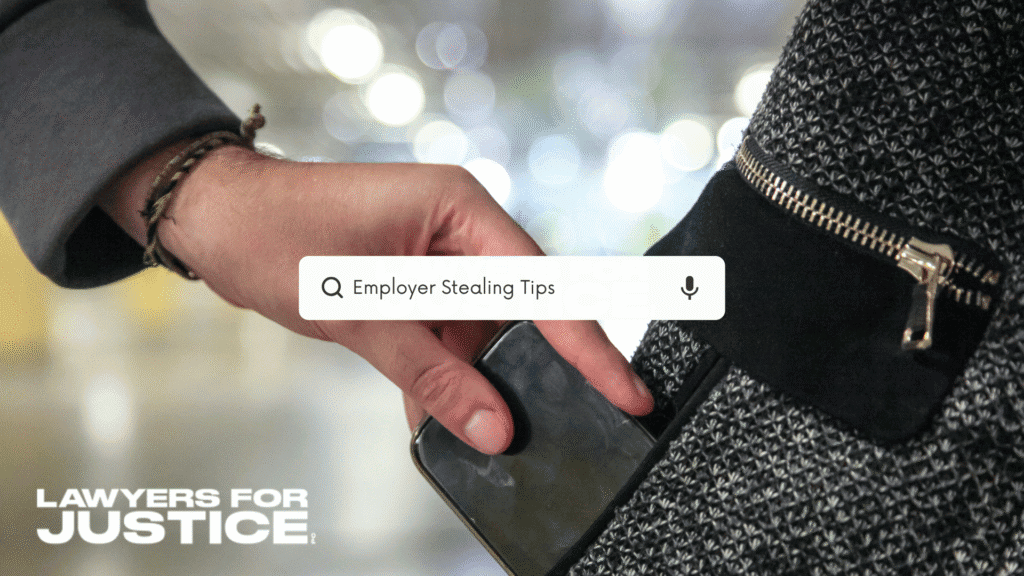Tip Theft at Work: Is My Employer Stealing Tips?
Attorney advertisement by Edwin Aiwazian of Lawyers for Justice, PC, headquartered at 450 N Brand Blvd, Glendale, CA 91203
For many workers in the service industry, tips make up a significant portion of their income. Whether they’re a server, bartender, delivery driver, or barista, service workers depend on the generosity of customers to supplement their wages.
Unfortunately, some employers may engage in unethical, or even illegal, practices by taking a share of employee tips. If a worker suspects that their employer is stealing tips, it’s crucial to recognize the signs and take appropriate action.

Understanding Service Worker Rights
California has some of the strongest worker protections in the country, especially regarding tip theft. California labor laws provide clear guidelines on how tips must be handled and they impose harsh penalties for employers who violate them.
California Labor Code 351 states that employers, managers, and supervisors can’t take any part of an employee’s tips, as they belong solely to the employee for whom the customer left them.
Employers can’t deduct business costs from tips and must distribute tip pools fairly. They can’t take a share for themselves. If an employer is caught violating the labor law, they can be susceptible to wage theft claims – and according to California Labor Code 354, negligent/reckless employers could be guilty of a misdemeanor and can be punished by either a $1,000 fine, 60 day imprisonment, or both.
Signs That an Employer Might Be Stealing Tips
1. Tip Pooling That Benefits Managers or Owners
Tip pooling is legal in some circumstances, but only when tips are distributed among employees who directly serve customers. If managers, supervisors, or owners are included in the tip pool, it is a major red flag and may indicate unlawful handling of tips.
2. Tip Deductions for Business Costs
Deducting money from an employee’s tip to cover business expenses like credit card processing fees, breakage, or losses may constitute tip theft under California Labor Code Section 351. Employers are generally required to cover their own business costs without using employee tips.
3. Not Receiving Any or All Credit Card Tips
If customers leave tips via credit card, employers must ensure that employees receive the full amount. While some states allow employers to deduct processing fees, they cannot withhold or delay credit card tips. If there are any discrepancies, an employer might be stealing tips.
4. Tip Discrepancies on Paychecks
If an employee’s cash and credit card tips are reported on a paycheck, they should check the tip earnings closely. If there are discrepancies between what is received and what was reported, then the employer may be skimming tips.
5. Employers Keeping Service Charges
Some businesses impose “service fees” instead of traditional tips, particularly for large parties or catered events. If customers believe service fees are going to employees, but the business retains them, the employer may be engaging in deceptive practices. The employer could be violating California’s Unfair Competition Law (Business and Professions Code Section 17200), which prohibits unlawful, unfair, or fraudulent business practices.
6. Cash Tips Are Collected and Not Fully Distributed
If an employer requires their employee to surrender all cash tips at the end of a shift and does not return them in full, an employee may have reason to be suspicious. While some tip-sharing systems are legal, if management retains a portion of the tips, they may be acting improperly.
What to Do If An Employer Is Stealing Tips
If an employee believes their employer is stealing their tips, it is vital they remain calm and gather evidence to prove their claim.
Evidence can include: detailed records of daily tips (cash and credit card), photos of receipts, copies of paystubs, and company policies regarding tip collection and distribution.
Once enough evidence is gathered, it is highly recommended to consult with an experienced employment attorney who will look over the details of the case and determine whether a claim can be made.
Call Lawyers for Justice, PC Today
Tip theft is a serious issue that affects thousands of workers.
Lawyers for Justice, PC is a premier employment law firm that is committed to fight for workers’ rights. With over a decade of experience representing clients who have experienced wage theft, the legal team at Lawyers for Justice, PC is confident they can secure the compensation their clients deserve.
Contact (818) 647-9323 today for a free case consultation.
Attorney advertisement by Edwin Aiwazian of Lawyers for Justice, PC, headquartered at 450 N Brand Blvd, Glendale, CA 91203